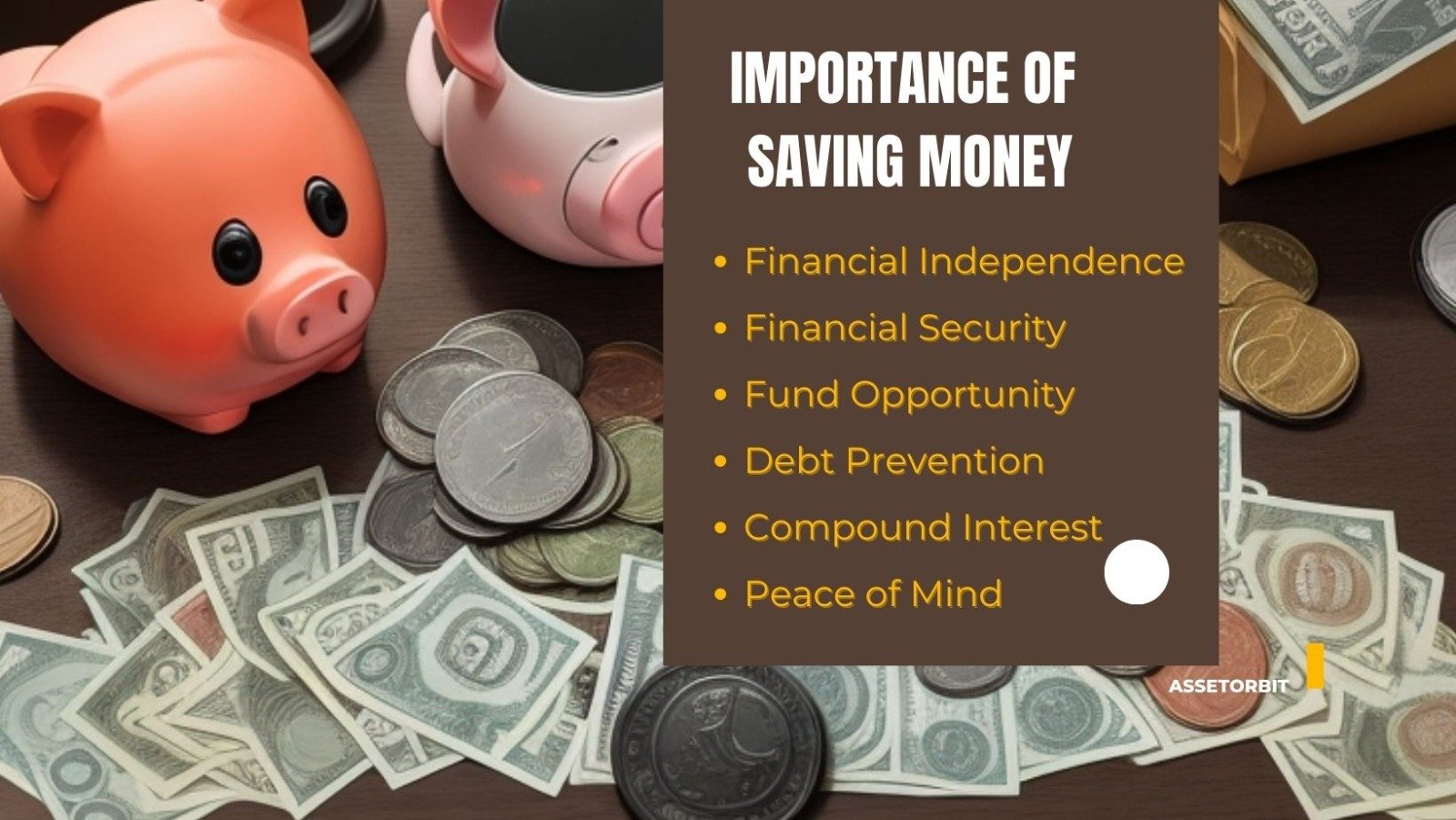Saving money provides financial independence, security, and stability, enabling individuals to make life choices based on their interests. It serves as a safety net, shielding against unexpected expenses and promoting financial well-being. By adopting strategies such as viewing saving as a lifestyle, investing in personal growth, and weaving savings into daily routines, individuals can pave the way for a secure, fulfilling, and empowered future.
Did you know that saving money is a smart financial move and a path to financial independence? Start our financial wisdom journey by exploring the importance of saving money. Life is unpredictable, and emergencies can happen anytime. Approximately 40% of people worldwide struggle with unexpected expenses. Saving money gives you a financial cushion to weather life’s surprises. Ever heard “the earlier, the better”? Nothing could be truer about saving. Start saving today to benefit from compound interest. Small donations can grow over time, making your money work for you. Join the growing community of smart savers taking charge of their finances. Saving money is a mindset that helps you build a secure and prosperous future.
What Is Money Saving?
Money saving is the art of securing your financial future through careful and strategic financial decisions. It involves consistently setting aside money, regardless of the amount, to create a financial cushion for both anticipated and unexpected expenses. Think of it as a financial safeguard that helps you handle emergencies with ease. Saving money goes beyond merely cutting back on small expenses; it embodies a mindset that enables you to achieve your aspirations, whether that means purchasing your dream home, pursuing higher education, or enjoying a stress-free retirement. Saving money is a powerful tool that empowers you, providing peace of mind and the freedom to enjoy life according to your own terms.
Why Saving Money is Important?
Saving money isn’t just a habit; it’s a game-changer that unlocks doors to a secure and stress-free future. Consider a safety net that protects you from life’s unforeseen twists and turns, giving you peace of mind and financial freedom. The significance of saving money lies in its ability to transform aspirations into reality, from achieving your goals to navigating unexpected challenges. Stay tuned as we go over the compelling reasons why saving is the key to accessing a world of financial opportunities!
Benefits of Saving Money
1. Financial Independence
Imagine saving money as your personal roadmap to freedom—a journey toward financial independence that frees you from the shackles of financial restraints. The essence is in the transforming power of savings, which allows you to make life decisions based on your interests and ambitions rather than immediate financial demands.
Financial independence is the ability to maintain a desired lifestyle without relying on external income sources. Saving money is the key to this freedom, as it helps build a financial reservoir that allows for choice. Financial freedom enables individuals to passionately pursue their passions, thereby mitigating the impact of financial risk. Savings help in starting a business, changing careers, or dedicating time to creative endeavors, allowing decisions to align with long-term goals and aspirations and eliminating the need for immediate financial gains.
Financial independence offers stress and anxiety relief, allowing individuals to weather economic uncertainties and challenges. It provides a foundation for building an ideal life, unlike being tied to financial obligations. Saving money is not just about accumulating wealth; it’s about securing the autonomy to design a life that reflects one’s values and passions, rather than just accumulating wealth.
2. Financial Security
Saving money acts as a crucial safety net, protecting you from life’s uncertainties and ensuring your financial well-being. It’s not just a collection of funds; it’s a proactive strategy to handle unforeseen expenses with confidence and ease, ensuring you’re well-equipped to handle life’s uncertainties.
In the event of unexpected car breakdowns or medical expenses, financial stress can arise. By consistently saving a portion of your income, you can create a financial cushion, providing peace of mind and stability to navigate these challenges without compromising your financial health.
Disciplined saving is a key to financial stability, allowing individuals to face uncertainties with resilience and a solid foundation. This proactive approach not only secures peace of mind but also establishes a stable financial future. It empowers individuals to face life’s unpredictabilities with confidence, turning potential financial storms into manageable situations.
3. Fund Opportunity
Savings serve as a powerful tool for achieving dreams and exploring exciting opportunities. By diligently saving, you create a financial platform that allows you to access various ventures and experiences that might otherwise be out of reach. Imagine planning a dream vacation, exploring new destinations, and creating lasting memories. Your savings fuel these experiences, turning distant aspirations into achievable goals. Funding your dream vacation is not just a financial achievement but also a testament to the empowerment of disciplined saving.

Having available funds is crucial for those with entrepreneurial aspirations, as it provides the necessary capital to launch and sustain a business venture, whether it’s a passion project or a full-fledged venture. This financial foundation enables confidence in investing in ideas, products, or services during the initial stages of entrepreneurship.
Having funds readily available allows you to seize investment opportunities in stocks, real estate, ETFs, or other wealth-building ventures. This proactive approach positions you to potentially grow your wealth and achieve long-term financial goals.
Saving money is not just about accumulating funds; it’s about creating a tool to embrace life’s possibilities. By strategically managing finances and building a robust savings pool, you can unlock a world where dreams become attainable and exciting possibilities become attainable.
4. Debt Prevention
Saving serves as a strategic defense against debt traps by creating a financial cushion and safety net, which reduces the need for credit during emergencies. This proactive approach promotes long-term financial well-being by avoiding high-interest debt. When faced with an unforeseen expense, like a medical emergency or car repair, savings can act as a primary safeguard. This strategy allows you to access your savings without incurring debt, ensuring you can cover these costs without relying on credit cards or loans.
Savings offer a significant advantage over credit, as they prevent high-interest rates associated with loans or credit cards. Borrowing money with high-interest debt results in additional payments due to interest charges. Having a financial cushion through savings helps avoid these costly interest payments, ultimately saving money in the long run.
Instead of burdening yourself with monthly debt payments, using savings instead of credit offers financial control, allowing for emergency expenses, necessary expenses, and stress reduction. Saving is a proactive financial strategy that helps manage unforeseen circumstances without high-interest borrowing. It promotes financial resilience and stability by breaking free from the debt cycle. Building and maintaining a solid savings habit is crucial for responsible financial management, ensuring a healthier and more secure financial future.
5. Compound Interest Magic
Imagine your early savings as seeds planted in the fertile soil of compound interest, which can dramatically expand your wealth over time. This concept serves as a financial accelerator, enhancing the value of even the smallest contributions and laying the groundwork for a strong and resilient financial future.
Compound interest is a financial concept that involves earning interest on both your initial savings and the interest that accumulates over time. This creates a compounding effect, allowing your money to work for you by generating additional earnings that contribute to the growth of your overall savings. For instance, if you begin to save regularly, the interest you earn will also start to earn interest, which accelerates the growth of your savings and creates a snowball effect for wealth accumulation.
Early savings are often called the golden years for building wealth because even small contributions made during your early working years can develop into a substantial financial foundation over time. By focusing on early savings, you utilize time as a valuable resource, benefiting from the compounding effect and creating a financial snowball that grows in momentum and size as time passes.
6. Peace of Mind
A well-padded savings account offers a sense of security and tranquility, acting as a buffer against the unpredictable fluctuations of life. It is not just about accumulating money; it fosters confidence and peace of mind. In situations like unexpected expenses, having a well-padded savings account provides an immediate sense of calm, allowing you to confidently address the situation without stress or scrambling for solutions. This financial preparedness is essential for a secure financial future.
Financial security is essential for daily life, influencing decisions like education, career advancement, and personal development. A well-padded savings account allows for long-term goals to be aligned with financial constraints. Financial preparedness provides peace of mind, enabling resilience in life’s challenges. A well-crafted savings strategy not only safeguards financial well-being but also contributes to overall well-being. This mental and emotional stability is a testament to the power of a well-crafted savings strategy.
Secret Ways of Saving Money

1. Embrace Savings as a Lifestyle
Think about integrating savings into the fabric of your life, transforming it from a burdensome activity into a natural and empowering practice. Learn from Warren Buffett’s financial expertise as a financial titan who supports the notion of valuing value over excess. He drives an old car and lives in a familiar house, proving that material possessions do not have to determine your worth.
View savings as a financial companion that aligns with your values and aspirations. By adopting a mindful approach to spending, you can achieve financial freedom, similar to Warren Buffett’s satisfaction with a simple lifestyle. While it’s acceptable to indulge occasionally, long-term planning remains essential for a secure financial future. Savings act as a buffer against luxury items that could lead to unnecessary debt, helping to balance enjoyment with the goal of securing a stable tomorrow.
2. Invest in Yourself
Investing in personal growth and development, a strategic and transformative investment, yields substantial returns compared to investing in areas such as education, skills, and health.
Education should be seen as an investment, a lifelong journey that enhances knowledge and skills, making individuals more marketable and opening doors to new opportunities and career advancements, whether through acquiring a new degree, attending workshops, or pursuing online courses.
Investing time and resources in honing your skills, whether in technology, communication, or leadership, is crucial for professional and personal success. Continuous skill development ensures adaptability in an ever-evolving world.
Investing in your health is a valuable investment in your overall well-being. Regular exercise and nutritious eating habits can boost energy, improve mood, and enhance your quality of life. Preventive measures can also help reduce future healthcare costs.
Investments in personal growth and development yield enduring returns, shaping a future characterized by resilience, adaptability, and personal fulfillment. These investments, such as mastering a new language, acquiring a passion for a skill, or prioritizing health, enhance the richness and depth of life experience, contributing to a sense of fulfillment beyond financial gains.
3. Avoid the Luxury Trap
The trend of acquiring high-end items solely for display is a mistake in a world where luxury is often a lure. The true value lies in experiences, relationships, and personal growth that contribute to well-being, not just the logo on a product.
Luxury brands are appealing, but they don’t define one’s identity or intrinsic value. True self-worth comes from qualities like character, kindness, and personal achievements. While the temptation to make long-term financial commitments on luxury items can be tempting, it’s essential to resist this pressure. Assess the joy of a luxury purchase and whether it aligns with your values and financial goals. Focus on cherishing experiences, which contribute to personal growth and create lasting memories. Mindful spending involves considering the long-term impact of financial decisions and avoiding unnecessary long-term commitments on depreciating assets. This mindset promotes intentional and fulfilling consumption, leading to financial freedom and opportunities for meaningful investments. By avoiding unnecessary long-term commitments on depreciating assets, individuals can preserve their financial flexibility and create more meaningful investments.
4. Shift Your Perspective
Choosing experiences over material possessions is a transformative shift that emphasizes the enrichment of life through meaningful moments rather than accumulating tangible items. These experiences provide lasting joy and personal growth, as they provide unique and emotional impacts that last beyond the initial moment. Challenges in new activities or experiences foster personal growth by expanding perspectives, enhancing adaptability, and building resilience.
The shift toward experience encourages more mindful spending as individuals evaluate the value of their expenditures in terms of their impact on their overall well-being. Shared moments with loved ones create bonds and memories that endure, contributing to a sense of connection and strengthening relationships.
Events often have a lower environmental impact compared to the production and disposal of material goods, aligning with a more sustainable lifestyle and contributing to environmental well-being. Selecting experiences disrupts the hedonic cycle, where the instant gratification from a purchase fades, instead offering enduring satisfaction through enduring memories and personal development.
Finally, prioritizing experiences that align with passions and interests helps shape a richer and more fulfilling life story. In summary, prioritizing experiences over material possessions is an invitation to lead a more mindful, fulfilling, and intentional life, encouraging a shift from the transient allure of possessions to the enduring joy and growth derived from meaningful experiences.
5. Building a Safety Net
Cultivating the habit of saving with the future in mind is a vital step in building a financial safety net. It requires acknowledging the unpredictable nature of life—such as pandemics, wars, health emergencies, and accidents—and preparing for the unexpected. This proactive approach guarantees that you have the necessary financial resources to navigate challenging times without being unprepared.
Building a financial safety net is not just about accumulating money; it is about creating a safety net that cushions the impact of unforeseen events, such as job loss, medical emergencies, or home repairs. This provides a sense of peace of mind, allowing you to face challenges with a calmer demeanor.
A well-prepared financial safety net provides the adaptability needed during crises, allowing you to make choices that align with your long-term financial goals. By saving consistently, you mitigate the long-term impact of these events on your financial well-being, allowing you to maintain financial stability and recover more swiftly from setbacks.
Fostering financial independence is another benefit of building a financial safety net. Instead of being overly reliant on external support during challenging times, you have the means to navigate difficulties on your terms, maintaining a greater degree of control over your financial destiny.
In essence, cultivating the habit of saving with the future in mind is an investment in your resilience and adaptability, ensuring that you are not only ready for whatever life may bring but also positioned to thrive in the face of unexpected challenges.
Final Thoughts
The transformative impact of saving money on both current and future financial well-being highlights its importance. Through the lens of Secret Ways of Saving, the essay exposes the essence of making savings a lifestyle rather than a burden, pulling inspiration from renowned figures such as Warren Buffett. It highlights the importance of investing in personal development, avoiding the appeal of luxury for show, and shifting mindsets toward more thoughtful purchasing. The significance of saving emerges as a proactive technique, constructing a strong financial safety net to weather life’s unpredictability. Finally, the article advocates for the development of a savings attitude, not just a habit, but an approach that paves the way for a secure, fulfilling, and empowered future.
FAQ
How can students save money?
Students can save money by making a budget to manage their expenses, differentiating between needs and wants, and shopping for deals or secondhand things. Cooking at home and reducing dining out also contributes to cost savings. Sharing expenditures with roommates, purchasing old textbooks, and taking advantage of student discounts on various services all contribute to savings. Furthermore, avoiding unneeded subscriptions and seeking part-time work or internships might help to increase income. Small, steady savings accumulate over time, creating a financial cushion for unforeseen needs or long-term aspirations. Developing these habits early on places pupils on the path to financial responsibility and security.
Why is it important to save money early?
Saving money early on is critical since it opens up an unlimited number of financial benefits. The compounding effect plays a crucial role, amplifying even small contributions over time. Individuals can harness the power of time by beginning early, allowing their savings to grow and multiply. This proactive strategy not only establishes a solid financial basis but also fosters a disciplined saving habit. Early savings provide a buffer against unforeseen occurrences, providing peace of mind and lowering dependency on credit in times of emergency. Furthermore, by carefully investing collected wealth, one can pave the way for long-term financial goals and develop financial independence. In essence, the benefit of early savings extends beyond immediate necessities, laying the groundwork for a financially secure and empowered future.
Why is it important to save money at a young age?
Saving money at a young age is critical for establishing a secure and wealthy future. Starting early allows people to take advantage of the potential of compounding, which can turn even small deposits into enormous wealth over time. Developing a savings habit at an early age instills financial discipline and responsibility, laying the groundwork for making sound financial decisions later in life. Early savings help as a cushion against unforeseen expenses, providing a sense of financial security. Furthermore, it enables young people to pursue educational ambitions, invest in personal development, and negotiate life's uncertainties with resilience. Finally, saving money at a young age is an investment in financial well-being and the opportunity to design a more confident and self-determined future.













Leave a Reply